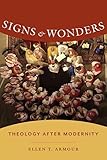Signs & wonders : theology after modernity / Ellen T. Armour.
Material type: TextSeries: Gender, theory, and religionPublisher: New York : Columbia University Press, [2016]Description: 1 online resource (323 pages)Content type:
TextSeries: Gender, theory, and religionPublisher: New York : Columbia University Press, [2016]Description: 1 online resource (323 pages)Content type: - 9780231540940
- 0231540949
- 9780231172486
- 0231172486
- Signs and wonders
- Philosophy and religion
- Philosophical theology
- Postmodernism
- Religion -- Forecasting
- Théologie philosophique
- Postmodernisme
- Religion -- Prévision
- RELIGION -- Christian Theology -- Systematic
- RELIGION -- Christianity -- General
- Philosophical theology
- Philosophy and religion
- Postmodernism
- Religion -- Forecasting
- 230 23
- BL51 .A665 2016eb
- online - EBSCO
| Item type | Current library | Call number | URL | Status | Notes | Barcode | |
|---|---|---|---|---|---|---|---|
 eBook
eBook
|
Biblioteca "Angelicum" Pont. Univ. S.Tommaso d'Aquino Nuvola online | online - EBSCO (Browse shelf(Opens below)) | Online access | Not for loan (Accesso limitato) | Accesso per gli utenti autorizzati / Access for authorized users | (ebsco)1158401 |
Browsing Biblioteca "Angelicum" Pont. Univ. S.Tommaso d'Aquino shelves, Shelving location: Nuvola online Close shelf browser (Hides shelf browser)
Includes bibliographical references and index.
Vendor-supplied metadata.
Frontmatter -- Contents -- Acknowledgments -- Introduction: Making Space, Marking Time -- Chapter 1. Man and His Others: A History of the Present -- Chapter 2. Photography and/as Bio-Discipline: Photographic Askesis -- Chapter 3. Bio-Discipline and Globalization: The Crisis in the Anglican Communion -- Chapter 4. Regarding The Photographs of Others: Abu Ghraib and/as Bio-Discipline -- Chapter 5. Bio-Discipline and the Right to Life: Becoming Terri Schiavo -- Chapter 6. The Perfect Storm: Hurricane Katrina -- Conclusion: Marking Time, Making Space -- Notes -- Bibliography -- Index.
We are told modernity's end will destabilize familiar ways of knowing, doing, and being, but are these changes we should dread--or celebrate? Four significant events (and the iconic images that represent them) catalyze this question: the consecration of openly gay Episcopalian bishop Gene Robinson, the mistreatment of prisoners at Abu Ghraib prison, the politicization of the death of Terri Schiavo, and the disastrous response to Hurricane Katrina. Framed by an original appropriation of Michel Foucault, and drawing on resources in visual culture theory and the history of photography, Ellen T. Armour explores the anxieties, passions, and power dynamics bound up in the photographic representation and public reception of these events. Together, these phenomena expose modernity's benevolent and malevolent disruptions and reveal the systemic fractures and fissures that herald its end, for better and for worse. In response to these signs and wonders, Armour lays the groundwork for a theology and philosophy of life better suited to our (post)modern moment: one that owns up to the vulnerabilities that modernity sought to disavow and better enables us to navigate the ethical issues we now confront.
In English.









